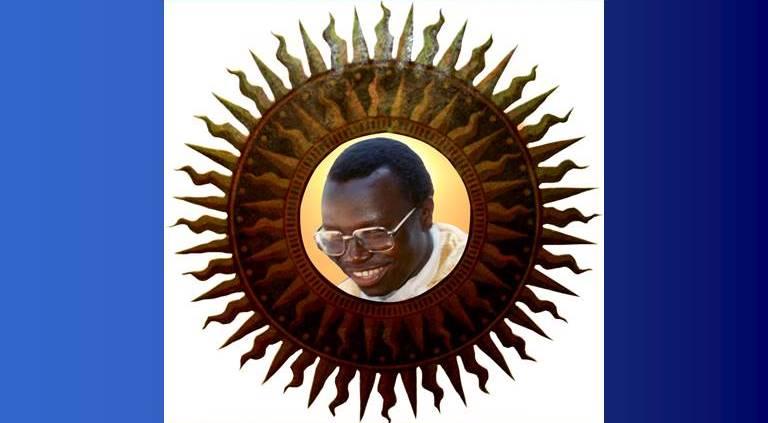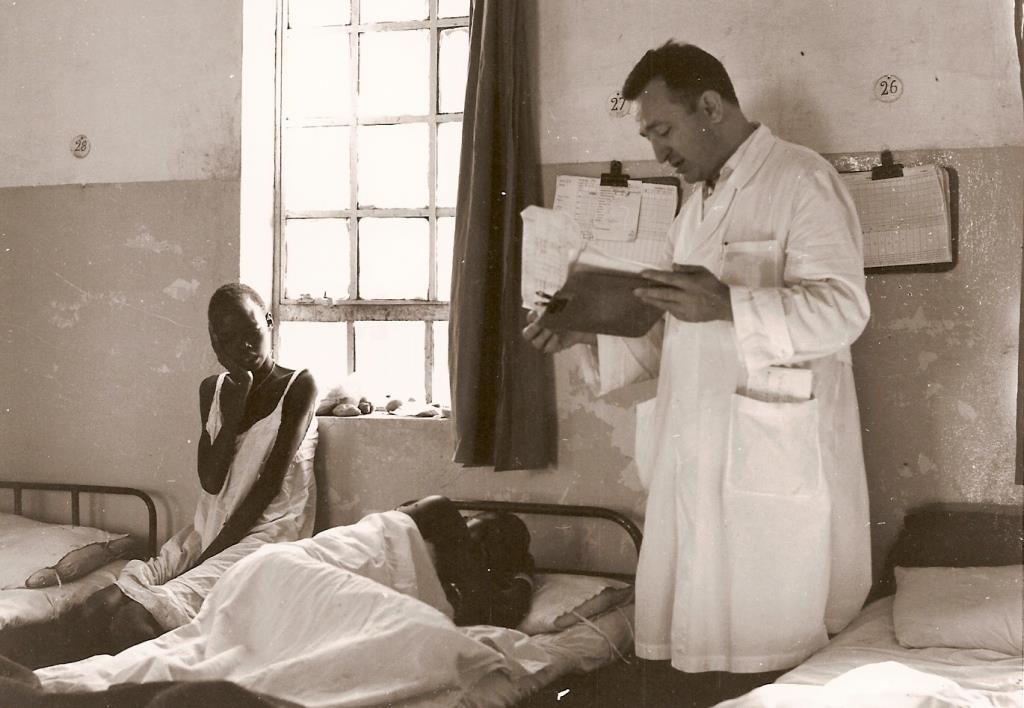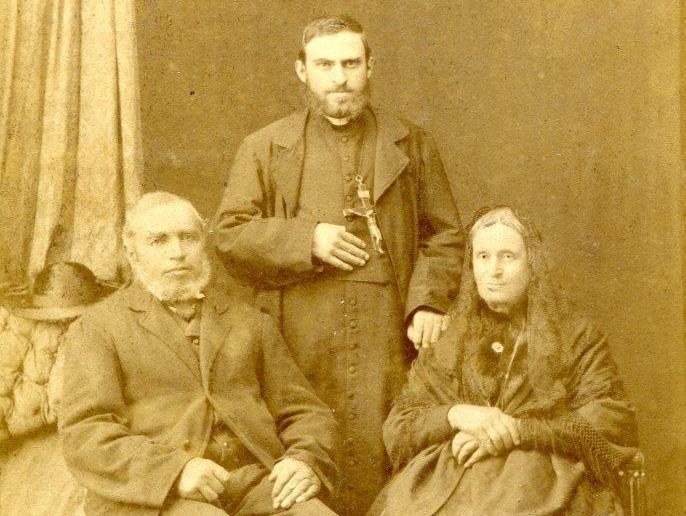Daniel Comboni
Missionnaires Comboniens
Zone institutionnelle
D’autres liens
Newsletter
"His sudden death is a great loss and at the some time a great asset. If Africa is saved through sacrifice (and in Christ and Comboni’s perspective, we cannot think otherwise!), an African Comboni Missionary has now given his blood contribution in Uganda." (Fr. L. Carraro).
 THE FINAL CALL:
THE FINAL CALL:
A PRIEST FOR EVER
Through many years of preparation, William willingly followed the faithfulness of God who had called him to priesthood. And with such a powerful help he fulfilled desires and hopes he nourished since his youth. The day of his ordination is brief1y described by his brother Alex Ijjo:
"I stood in the same row with Deacon William, my mother Katerina and my uncle Arkangelo Ogwa, who represented my deceased father. Monsignor Frederick Drandua the Bishop of Arua Diocese ordained William to the priesthood on the 20th August 1988 in an open air Mass in the mission of Moyo. The presentation of William by his parents to the Bishop was, not done in the long procession that was becoming customary and popular. William walked with long and confident strides to the altar when the bishop called him. His mother and uncle followed closely behind. There were several people for the Mass, if also because William’s father's clan is situated just behind Moyo mission. The occasion passed on smoothly. The choir was good and people were visibly happy and hopeful. In the afternoon during the presentation of songs and plays to mark the occasion, William joined the "kore" traditional dance and made people laugh by his enthusiasm and funny way of dancing.
Morulem: William’s first Assignment
Although Fr. William had been asked to work with 'Leadership Magazine', yet he was quite happy to start his priestly activities with pastoral work. He was appointed to work in Morulem Parish, in Kotido Diocese.
Administratively the parish depends on Kotido District, where Karimojong people are the majority. Morulem itself is the center of the Labwor, a Lwo speaking ethnic group. William was very familiar with Lwo languages, so he did not find it difficult to start his pastoral work and put all his energies into it. After his death different people witnessed to his successful ministry. Fr. Klement Otim, a native of Morulem, at present Vicar General of Moroto Diocese wrote: “I do not know what particular problems Fr. William faced as a priest, but one thing I know is that, whenever met him, he expressed to me as a native of Morulem, his concern about the Labwor people as his people. In other words the problems, the sufferings, joys and frustration of the Labwor among whom he worked, were his problems. No wonder, he was so dear to them. My own experience of Father, is of a kind hearted, good and intelligent person.
I saw him listen to those who came to see him. I read compassion and understanding, love and concern. Where he had to be firm and say no, he did it respecting the other person's dignity. I was impressed, it reminded me that Jesus must have been something like that, even if this was only a shadow. I did find Father Willie to be a prayerful man. To me this was his secret, he was able to integrate his faith, his learning and his African roots in an admirable way.
I believe that Fr. Willie’s contribution to the Church, is the example and witness that his life was and is. This remains a challenge for his institute as missionary in the world of today. For the faithful among whom he worked, he certainly was a taste of God's goodness and love. The general refrain was, "Why did God take away such a good person?" Many expressed aloud the irony, that "Good people often die soon." Whatever value one can give to such sayings, it showed who Willie was for his parishioners, and how they missed him. "
People remember him for his enthusiasm in preaching his engaging homilies. The Comboni Sisters of Morulem were impressed by a meditation he gave to the religious community:
“In the meditation on the last day of recollection he gave us Sisters at Morulem, the 14th October, on the theme: "The Joy of being a Missionary", he told us what he thought was the relationship, the sharing of each one of us in the joy and enthusiasm of Jesus, the Missionary. In Lk. 10:21, Jesus rejoices in the Spirit and thanks the Father because he has revealed the secrets of the Kingdom to the little ones, the simple. This was the main point that Fr. William shared with us and made into prayer during the Mass. This must be the joy of the missionary, that shows in meeting the people, in activity and in every moment of the day. Only in this way can the missionary communicate the Good News to others, and Christ be present and effective in our lives.
In commenting to Irene Feliza, a novice with the Gray Sisters, the encounter of the Samaritan woman with Jesus, he revealed the depth of spirituality and the capacity to communicate it: "Values are good but they cannot give us full satisfaction. Our commitment should be an attitude of trust and confidence in God. He does not deceive us, if we put the Scriptures into practice - it becomes true. What does it, mean to say that: "I have encountered Jesus?" In one way or another, it is the realization that there is possibility for me to have the fullness of life. I'm loved deeply by God, He is with me, concerned for my good. I have this possibility of having the fullness of life with Him..." "As missionaries, we might be tempted to think that we get salvation from what we do. Temptation of doing. I will make a pilgrimage to Jerusalem, but Jesus say: the day will come, when you will worship the Father in Spirit and in Truth. “This means: to have experience of oneness, with God, be one with Him. This is a communion that goes even beyond death. When we discover the treasure of this oneness – nothing separate us…"
The Sudden End
When people die after a long illness or in other similar circumstances, people near them come to know at least something about their attitude towards death. In the case of Fr. William we can only interpret a comment about death that may reveal his attitude. He was in Kampala when Bishop Caesar Asili, a relative of his, died after a short illness.
"In the late afternoon we went to Nsambya Hospital where the body of the Bishop was. I was struck by the serenity with which he looked at the whole reality. We returned for the celebration of the Eucharist where he was the presider. William told us that in the three months after his priestly ordination, this was his third funeral Mass. He began the homily by stating that: ‘Right from the beginning of the history of humanity, death has always been a threatening reality. But for us Christians, we have hope in life after death by fixing our eyes on Jesus our Savior, who died and was raised from the dead. Without this hope we would continually be crashed by this threat.' These words remained as a souvenir of my beloved William seeing how his faith vision helped him and others to face realities in this world."
However, this attitude is explained in the clearest way possible in the quote he chose for his ordination card, a quote from the writing of Blessed Daniel Comboni himself: "The happiest of my days be when I shall be able to give my life for you." As it turned out, death met him as he was travelling by motorcycle for the sake or his ministry among the people entrusted to him by the One who had called him to follow His steps.
The details of his death were given in full by the Comboni Sisters of Morulem Parish.
On friday, 25th October, 1991, around 9 a.m. Fr. William told Brother Gregori that he was about to go to Moroto by motorcycle, a distance of km 120, to pick up the tithing forms that had to be distributed in church the followillg Sunday. It was quite common for the missionaries of Morulem to cover that distance by motorcycle and be back before dark. Nothing had ever happened along that road, no one had ever even been robbed. However, by evening William was not yet back and everyone was worried. During the 20.30 radio call appointment various missions were asked about William, but no one had seen him.
By then it was dark and nothing could be done until the next morning. The next morning another call was launched, but to 110 avail. At that point, search parties set out on three different roads. Fr. Ciapetti led a party from Matany, Fr. Grandi the one from Moroto, while Sr. Silvia, Bro. Gregori and four orderlies set out from Morulem. At about 11.30 the parties from Morulem and Moroto met. At 12.00 Fr. Ciapetti sent word that he had found nothing. A short time later the two parties saw skid marks that could have been made by a motorcycle braking. To the right, the six-foot tall grass is bent as if someone had walked through it. Sr. Silvia, Fr. Grandi and two men followed the tracks through the grass. After about 50 meters they found the motorcycle properly parked on its stand and undamaged, so much so that the engine started at once. Not too for they find William's helmet.
Sr. Silvia, Fr. Grandi and the two men exchanged shocked, desolate looks, as they sensed that something had gone terribly wrong. Sr. Silvia, unable to hold back her concern, began to call out, "William! William!" About 100 meters from the road they found William s body, lying face down in the grass. He had been stripped, except for his underpants. His arms and hands were crossed to support his head. It looked like a position taken deliberately, carefully, serenely, even though imposed by others. That is how he was found, and that is how he was laid on the stretcher and carried to Morulem! Everyone who saw him noted the serenity of his face. The memory of that face will not fade.
At His supreme moment William had prostrated himself on the ground and laid his forehead on his crossed hands, as he had done on the day of ordination. The calm of his face leads us to surmise that he was aware of his sacrifice, and that he had offered it with Jesus to the Father, for the good of many. His heart was transfixed by a bullet, shot through his back and the ground below was still wet with his blood. There were no friends to witness his sacrifice. Fr. William died like Jesus, the Good Shepherd whose Heart was pierced! The sacrifice was consummated. William has carried out the com
mand of Jesus: "Do this in memory of me."
Priest and victim, Missionary of the Gospel, martyr with Christ for his brothers and sisters, now William is a priest forever - for eternity. Thank you, William. Thank you for the joy that you have left us as an inheritance, to better serve our brothers and sisters.
Further details of his death are in a letter that Fr. Martin Devenish wrote on December 3, 1991.
"As of yet we have no idea of why Father William was killed. On the 25th November, exactly one month after his brutal murder, I went to the place where he was killed with other priests, religious and some of our laity to celebrate the Holy Mass for his eternal repose. Clearly they brought him off the road, not for robbing but to kin him. It is a very deserted and lonely spot; and they must have heard his motorcycle coming some kilometers before he reached the place of his death. Some think he recognized the robbers, so they killed him. More probably, the priests diviners of some area ordered warriors to kill someone (anyone) on a motorcycle so that the clan could avoid some imminent catastrophe. We know that such a story has been going around for at least a year; in fact some local people who have motorcycles (officials of the Government) stopped using their cycles on long distances some months ago. So perhaps William’s death was a sacrifice. The Police and Army have not even attempted to investigate the murder, so perhaps we will never know the truth."
Returning Home
After the funeral that took place in Morulem, attended by a large crowd, the body of Pr. William was taken to Moyo among his people, where he will continue to intercede for them as a perpetual victim before them and before the Lord, still as priest as a victim to cry for forgiveness and for blessings.
A cross was planted at the very spot where his blood was poured. Unfortunately the place has since been desecrated by people or by animals. Did his murderers tear it up, fearful of any memory of his death? We will never know.
What we know is that the memory of this extraordinary young priest and missionary will never fade from the memory of the people in the dioceses of Moroto and Kotido.
On the first anniversary of William's death a special Eucharistic celebration was held in all the Comboni Missionary communities in Uganda. The name of Pr. William Nyadru has been added to the list of all Comboni Missionaries who have died since the beginning of the Institute. Every year on the 25th October his name will be read during the Sacrifice of the Mass.
At the anniversary celebration Fr. Vittorino Colla, then Provincial Superior of the Comboni Missionaries in Uganda wrote the followillg poem: . .
"Unless a grain of wheat falls on the ground and dies
it remains on1y a single grain
But if it dies, it yields a rich harvest" (Jn. 12:24).
Days have turned into weeks, weeks into months...
A year has gone, dear William, since your sacrifice.
The place where you died,
the ground soaked by your blood
is marked by a simple cross.
A deserted place on a lonely road .
often fromped upon by famished herds of cattle,
prodded by fierce warrior herdsmen.
They see that Cross... They quicken their steps, ashamed, disgusted.
Some of their friends, or perhaps their enemies
have killed a man innocent and kind.
"The blood of your brother cries out to me from the ground..." (Gen. 4, 10).
That blood out cries out indeed, it prays to God.
Pardon, not vengeance! Peace, it implores for all.
Let spears and gulls give way to plowshares.
Let hatred and violence give way to love and friendship.
William we remember... we feel you are near.
Pray for us to the Lord.
Reactions to William’s Death
One of the best comments on Fr. William Nyadru's death and on his lire as well, came from the Superior General of the Comboni Missionaries, Fr. David Glenday, in a letter to the family and the Madi Christian Community:
"We are one with you in your sadness and grief at the loss of William. Many of us knew him personally; I myself spent two years in the same community as him while he was studying in London. In William your family and your Christian community had made a great gift to the Comboni institute and to the Church 's universal mission. What a gifted young man he was! Together with his outstanding intellectual gifts, he was a dedicated and convinced missionary and a human being of balanced judgement, who lived with commitment and joy. He was a great example to us all and to me personally.
Now the Lord has called him to Himself. Our Christian faith leaves us in no doubt that William did not die in vain and we can be certain that the Lord will be bringing manifold gifts from his sacrifice. We pray that among these gifts there may be peace with justice for our beloved Uganda and a new commitment to the Gospel way for your own Christian community. Now that the Church in Moyo has given one of its number in this way it will certainly feel called to live its Christian faith with new maturity and dedication.
Please God, the example of William will inspire many young men and women in Uganda to commit their lives to the spreading of the Gospel." .
Very meaningful is also the testimony of Mr. Richard Gray, a wen known expert and writer of African affairs. In a letter to Fr. R. Dellagiacoma he acknowledges the tremendous loss the Church in Uganda has suffered with the death of Fr. William.
"I have just returned to London from a visit to Bergamo to hear the very sad news of Father William’s death. I was his supervisor while he took the M. A. with us and we an appreciated very greatly his contributions to our Religious Studies seminar, and above an his warm friendship and humanity. He fully realized the dangers he was likely to confront on his return to Uganda. I well remember discussing them with him: but he was in no way dismayed by them and the possessed great faith in the future of the Church in Uganda.
It is indeed a tremendous loss, but against that, one can give heart-felt thanks for his life and witness, even though it was cut short so tragically."
Many messages of condolence reached the Comboni Missionaries and the family, all expressing dismay and sorrow. Cardinal Tomko, Prefect of the Congregation for the Evangelization of Peoples and Cardinal Hower, Prefect of the Congregation for Religious, both sent personal letters to the Comboni Missionaries.
Mama Katerina expressed her feelings in a letter to a Comboni Missionary:
"I am with deep sorrow for the great loss of my Son, late Fr. William and, in the name of God, I join you people to pray for his soul. I brought him up through great difficulties as a widow. My sadness is God’s arrangement."
The meaning of his death is wen expressed by Sr. Irene Pinedo Cervignon (Comboni Sister). .
"Death Speaks Loudly: Through the surprising death of Fr. William Nyadru as I listened to, I hear only the silenced writer who does not want to keep silent and I say that he is for us:
A Reminder: In case we have forgotten the painful experience of Christ's death which set us free, and that of thousands of brethren that perpetuate his passion continuously on the road to Calvary.
A Living Sacrifice: He was also dear in God's eyes as the same Christ was to His Father and Mother, as Isaac to Abraham and Sarah ... I overheard that during that time the Karamojong were chassing for someone, so as "to have a precious sacrifice" to be offered to their god; and if that was the case - they were on the right track! Let us hope and pray that these people of ours someday may come to know the value of the love of Christ and of so many people for them.
A True Believer: At the moment of his death, only merciless brethren surrounded him and no one can ten us what he said or how he felt. Of one thing we can be sure: his solitude was filled with the presence of his God in whom he trusted; "No end nor term is fixed to a life well lived..." (Wis 1:15).
A Good Friday: This is a day very special in our spirituality. Fr. Nyadru laid down his life like the Master on a Friday, his heart was pierced in the same way, and his blood shed till the last drop, so we do not lose hope, "Good Friday is not the last word, but it is only the dawn of Easter." As the Church was born from the pierced heart or Jesus, our Comboni Family can be renewed by the generosity and love with which our Martyrs shed their blood..."
For Whom Shall We Cry? "Daughters of Jerusalem, Jesus told women, do hot weep for me. Weep for yourselves and for your children." (Lk. 23:28) Faced with the loss of our dear missionaries, we cry for them and it is good to mourn for the human separation."
The words of Jesus point out that what we might need most is to cry for ourselves and for our people. The reason we do not profit from death’s lessons is that we look at our departed as if they were the losers, while that is exactly what we, the living, are. Let us continue to pray even in tears "that we may see" what needs to be changed and may have the courage to do it before it is too late. To cry may be good, but it is not enough!" . .
During the last 25 years many Ugandans have been killed. Under the dictatorship of Idi Amin (1971-1979), 300,000 people are reported to have disappeared. The guerrilla in Central Uganda waged by a succession of provisional government and then Milton Obote's against Museveni (1981-1986) claimed more or less the same number of victims. The guerrilla in the North between some Acholi tribes men and Museveni continues to c1aim countless victims. It is a good omen that Comboni Missionaries nave laid their life and mixed their blood with that of their people. In this way God wanted to ten missionaries that they are following in the footsteps of their founder. When blessed Daniel Comboni reached Khartoum in 1873, he addressed his flock as follows:
“I return among you, never again to cease to be yours and entirely consecrated to your greater good. Day and night, sun and rain will find me equally ready to help your needs. Rich and poor, healthy and sick, young and old, master and servant, shall always find a way into my heart. Your good shall be mine, and your sufferings shall be mine too.
I shall make common cause with every one of you, and the happiest of my days will be when I shall be able to give my life for you."
Comboni wrote to the Ecumenical Council, Vatican One, alerting bishops and cardinals to the necessity of speeding up the evangelization of Africa. He told them that the "brown pearl" representing Africa should shine in the jewelled crown of Our Lady in Heaven. The Comboni Missionaries killed in Uganda were all "White Pearls.” "Brown Pearls" had to be added to the bouquet of jewels offered to Comboni on the occasion of his Beatification in 1996.




